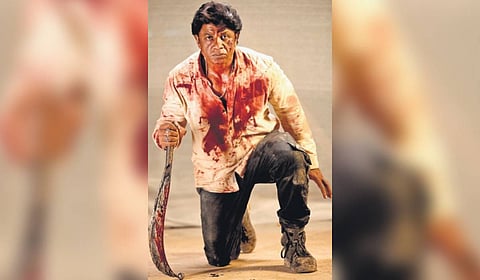

Bengaluru, often lauded as a garden city and an IT hub with a vibrant pub scene, has another side that isn’t always in the spotlight: the dark realities of drugs and slums. Vijay Kumar, known for his gritty approach in his directorial debut Salaga, follows a similar pattern with his latest film Bheema, offering a raw and unflinching look into the hidden realities of the city’s shantytowns.
The film’s raw style of direction combined with Charan Raj’s intense soundtrack contribute to a powerful and visceral experience. Shiv Sena’s cinematography, with aerial shots, vividly depicts the unfiltered violence and bloodshed with such rawness that it feels as if the screen is splattered with crimson, hitting you right in the face. Engaging Kannada rap songs by MC Bijju and Rahul Ditto also add to the intensity, while Maasthi’s hard-hitting dialogues further enhance the film’s impact.
In Bheema, a striking dialogue compares teenage kids to matchsticks. This metaphor sets the stage for the film, which explains the harsh conditions of a struggling neighbourhood where illegal activities among youngsters reveal the difficult circumstances they face.
The story introduces us to Ramanna (Achyuth Kumar), whose world collapses when his son succumbs to the relentless threat of drug trafficking. Under Ramanna’s roof, Bheema (Vijay Kumar), an orphan working in his mechanic shop, grows up to become a fervent anti-drug crusader. As Bheema evolves into a fearless leader, he takes on the drug trade’s formidable kingpin, Dragon Manju, to eradicate addiction from his community.
The film explores how marijuana seeps into the city, illustrating its extensive reach as it uncovers the exploitation of slum families and youth coerced into producing and distributing drugs. Through a series of intense and revealing scenes, Bheema offers an uncompromising look at this illicit trade and its devastating impact on communities, including both affluent and impoverished urban youth. The striking slum scenes and intense depiction of local gangsters amplify the harsh realities faced by these individuals, with real-life anecdotes from Bengaluru adding authenticity to the narrative.
Priya Shatamarshan plays Girija, a no-nonsense police officer who takes charge with relentless determination to curb rampant rowdyism and drug trafficking. Her character is a force of nature, unafraid to confront local thugs head-on and fiercely dedicated to upholding the law. Girija’s proactive stance and willingness to battle both Bheema and the notorious drug dealer, Dragon Manju, showcase her as a pivotal figure in restoring order.
Bheema highlights the widespread issue of drug abuse and its effects on various social classes, urging the need for solutions. Vijay Kumar’s bold portrayal as director and actor offers a fresh, eye-opening view of a city concealing its darkest issues beneath a facade of prosperity. The film culminates in a dramatic revenge conflict between Dragon Manju and Bheema, showcasing Bheema as both a victor and a loser.
Bheema features intense and unsettling scenes that are hard to watch. The depiction of drug consumption and brutal violence, along with crude language, justifies its ‘A’ rating. It does not shy away from showing the harsh realities of lower-middle-class life and the cycle of crime and addiction. The dialogue is marked by vulgar exchanges, and the film portrays gender bias and excessive bloodshed.
The film has its flaws, though. While Bheema provides a realistic portrayal and informative content, it falls short in narrative depth and cohesion. Its narrative is sometimes muddled, such as in a reckless bike-wheeling scene that leads to a tragic accident, followed by confusing flashbacks and inconsistencies in rehabilitation outcomes. Despite knowing the drug suppliers, the protagonist only confronts them at the end, leading to confusion about whether the story is about fighting drug abuse or seeking personal revenge.
In Bheema, Vijay Kumar’s portrayal of the titular character is compared to his namesake from the Mahabharata for the valour he shows in defending his community despite the severe risks that come with it. His dedication shines as he overcomes dangers and becomes a noble protector in the process.
Baby Amma, Bheema’s mother, played by Kalyanee, provides emotional support, highlighting the strong bond between them. Ashwini Ambarish, though limited in screen time, stands as Bheema’s steadfast supporter, representing loyalty and solidarity.
In stark contrast, Dragon Manju comes across as the menacing antagonist. His gigantic personality in the criminal empire, alongside enforcers like Jayasurya and Cockroach Sudhi—a privileged son caught in the web of crime—adds depth to the film’s dark side. Ramesh Indira’s role as an MLA contributes to certain political dynamics, involving a cameo by Rangyana Raghu as someone running a de-addiction centre. Raghu Shivammogga plays a police officer who undergoes a notable shift from corruption to integrity. Gopal Krishna Deshpande adds emotional depth to the story, and Priya Shatamarshan shines as Inspector Girija. Her portrayal as a fearless and resolute law enforcer stands out, showcasing strength and resilience.
As Bheema reaches its climax, the film’s raw and unrelenting violence brings the protagonist’s journey to a critical juncture. Bheema, who has taken the law into his own hands, faces the inevitable consequences of his actions as the police apprehend him. This dramatic turn highlights the personal cost of his vigilante actions and opens the door to new possibilities.
Director: Vijay Kumar
Cast: Vijay Kumar, Ashwini Ambarish, Priya Shatamarshan, Dragon Manju, Achyuth Kumar, Gopal Krishna Deshpande, and Shuddhi
Rating: 3/5 stars